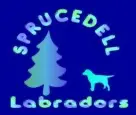“I now come to the most difficult art of all, the breeding of a strain that is equally at home in the championship showring and at Field Trials, and recognised as such by the other competitors in either of these widely separated spheres.
I started this book by pointing out that at any one time there are about twenty top breeders who can and do stay at the top for many years, but when I come to the breeders who can show their dogs as Championship show-prize winners and also run them in Trials as Trial dogs, accepted as such by the Trial people and not called ‘Bl—y show dogs’ as is their wont, then I find it hard to name twenty kennels that can do this in the last forty years.
Before the last War there were plenty of strains capable of doing this, indeed it was more or less the norm. The whole atmosphere of Labrador breeding was different, with such people as Lorna, Countess Howe seeing to it that the show Labrador remained a working dog. The Trials consisted of the great shooting houses running their shooting dogs, often handled by their own professional handlers. Then there were the great ‘hobbyists’, who were shooting men who could train and breed their own dogs, such as Lady Hill-Wood, the Macphersons, Major and Mrs. Wormald, Audrey Radclyffe, Col. ‘Coppe’ Blackett and Major Bromet. And added to these were the Keepers who ran very good experienced dogs of their own and were extremely welcome. The dogs were good-looking on proper Labrador lines, they were thoroughly experienced shooting dogs and cut out their own work with the minimum of help from their handlers, although always ready to take the hint when they were stuck. The good work on the day was put in by the dogs and not the handlers, and while Lady Howe was alive this happy state of affairs, when Trials were fun and you and your dogs welcome, remained until the sad day she died, when we immediately feared and experienced the Great Divide, into entirely show bloodlines and entirely Field Trial, poles apart.
Granted, Lady Howe did not know the meaning of the word Democracy and had no intention of letting it creep into the Labrador Club of which she was secretary, but her undoubted dictatorship, benevolent just as long as it suited her, was to my mind a great asset to the retention of the real working Labrador of proper type. We could see what would happen when she died and it did, all too fast. …”
Mary Roslin Williams, Mansergh



